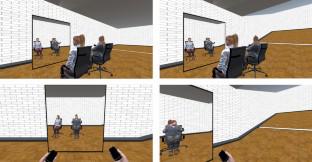Psychological Research ( IF 2.424 ) Pub Date : 2022-03-25 , DOI: 10.1007/s00426-022-01675-x Louise Dupraz 1 , Julien Barra 1 , Marine Beaudoin 2 , Michel Guerraz 1

|
Virtual reality immersion enables a person to embody avatars that strongly deviate from his/her biological body. Interestingly, the person’s expectations about the embodied avatar lead to congruous behavior, phenomenon referred to as the Proteus effect. The objective of the present study was to investigate, in virtual reality, the relationship between body-shape representation and expected physical abilities in a locomotor imagery task, in the context of overweight avatar embodiment. Given the negative stereotypes concerning overweight people’s physical abilities, we expected overweight avatar embodiment to have a negative impact on performance in the locomotor imagery task. Thirty-five healthy-weight participants, with a body mass index between 16.5 and 30 at the time of the experiment or in the past, embodied both a healthy-weight avatar and an overweight avatar on two different experimental sessions while performing the imagery task (walking four different distances on two different slopes). In accordance with our hypothesis, participants took longer to perform the locomotor imagery task when embodying an overweight avatar than when embodying a healthy-weight one (the “avatar effect”)—especially so when the distance to be covered was long. We conclude that, as has already been reported for people with anorexia nervosa, considering one’s own body to be fatter than it really is leads to congruent weight-related behavior.
中文翻译:

虚拟现实中超重身体表征对运动想象任务中运动的影响
虚拟现实沉浸使人能够体现强烈偏离他/她的生物身体的化身。有趣的是,人们对具体化身的期望会导致一致的行为,这种现象被称为普罗透斯效应。本研究的目的是在虚拟现实中,在超重化身具体化的背景下,在运动图像任务中调查身体形状表征与预期身体能力之间的关系。鉴于对超重人身体能力的负面刻板印象,我们预计超重化身会对运动想象任务的表现产生负面影响。三十五名健康体重的参与者,在实验时或过去的体重指数在 16.5 到 30 之间,在执行图像任务(在两个不同的斜坡上走四个不同的距离)时,在两个不同的实验会话中体现了健康体重的化身和超重的化身。根据我们的假设,参与者在体现超重化身时比体现健康体重的化身时(“化身效应”)花费更长的时间来执行运动想象任务——尤其是当要覆盖的距离很长时。我们的结论是,正如已经报道的神经性厌食症患者一样,认为自己的身体比实际更胖会导致一致的体重相关行为。与体现健康体重的化身相比,参与者在体现超重化身时花费更长的时间来执行运动想象任务(“化身效应”)——尤其是当要覆盖的距离很长时。我们的结论是,正如已经报道的神经性厌食症患者一样,认为自己的身体比实际更胖会导致一致的体重相关行为。与体现健康体重的化身相比,参与者在体现超重化身时花费更长的时间来执行运动想象任务(“化身效应”)——尤其是当要覆盖的距离很长时。我们的结论是,正如已经报道的神经性厌食症患者一样,认为自己的身体比实际更胖会导致一致的体重相关行为。


























 京公网安备 11010802027423号
京公网安备 11010802027423号